INNOVATION, EDUCATION & RESEARCH
SHAPING THE FUTURE
SHAPING THE FUTURE
The Advanced Materials Innovation Complex (AMIC) is a proposed new building that establishes Clemson University as a serious R-1 institution in support of the Clemson Elevate strategic plan. It will be the University’s most technologically advanced facility.
A NEW FACILITY WITH SERIOUS AMBITION
The overarching goal of AMIC is to be the nation’s premier cross-disciplinary advanced materials innovation, education and research enterprise. The success of this goal will propel the three core advanced materials departments—Materials Science and Engineering, Chemistry, and Chemical and Biomolecular Engineering—into the top 20.
Serious Research Impact
Serious Innovation & ECONOMIC IMPACT
Serious EDUCATIONAL AND WORKFORCE DEVELOPMENT IMPACT
THE MISSION OF AMIC is to support research and learning in advanced materials, driving innovation to create the next-generation workforce of engineers and scientists in the broad areas of advanced manufacturing, energy and health innovation.
A STATE-OF-THE-ART RESEARCH AND LEARNING FACILITY
AMIC will be the new home for the Materials Science and Engineering Department with strategic teams of advanced-materials-focused faculty from Chemistry and Chemical and Biomolecular Engineering. It will provide research facilities, educational laboratories and classrooms for multi-disciplinary research and education.
AMIC VISION The AMIC will serve as a modern land-grant research university hub that catalyzes discovery and creation of new knowledge, and prepares the next generation of thought leaders for the advanced materials revolution of tomorrow that will improve lives and lead to transformative economic development.
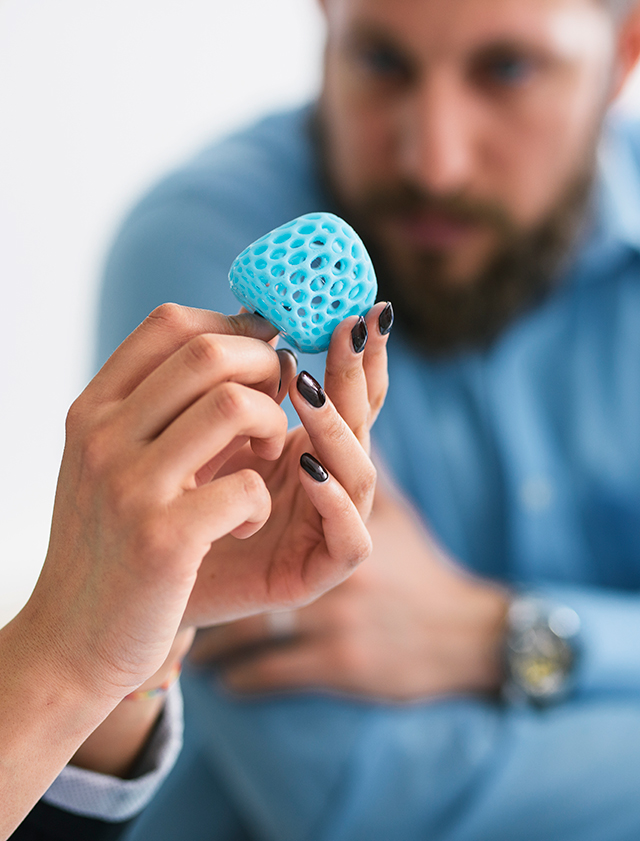
Research Focus Areas

Advanced Manufacturing
Areas of focus include smart and sustainable manufacturing, control and assembly operations, robotics, sensors, IOT, human-machine interface, AI, digital manufacturing.

Energy
Areas of focus include transportation technology, energy generation and distribution, electrical grid control and renewable energy, green chemistry, and bio-inspired design.

Health Innovation
Areas of focus include biomedical devices, biomaterials, regenerative medicine, health care delivery and access, green chemistry, personalized medicine, mobile health care access, health disparities, and health care systems.
A NEW INNOVATION COMPLEX
THE AMIC FACILITY
AMIC will be the marquee facility on campus. Through basic and applied research in advanced materials, it will help solidify the future competitiveness of South Carolina’s advanced manufacturing, energy and health sectors.
AMIC’S DRIVING FORCE
STUDENT IMPACT
100%
of the students at the AMIC will be conducting research.
Students will also take part in the Grand Challenges Scholars Program, an educational and extracurricular initiative designed to prepare the next generation of engineers and scientists to address this century’s most pressing challenges and opportunities, through the fulfillment of five main emphasis areas:

Cross-Disciplinary Curriculum
Scholars will complete coursework outside of engineering that is related to their Grand Challenge.

Entrepreneurship
Scholars will practice translating invention to innovation.

Global Engagement
Scholars will develop their global perspective and demonstrate application of this perspective.

Research/Creative Inquiry
Scholars will make significant progress on inquiry related to their Grand Challenge and present their findings in a professional and engaging manner.

Social Consciousness
Scholars will apply their unique skills to societal problems at the local scale.
LEARNING SPACES
*Conceptual Illustrations
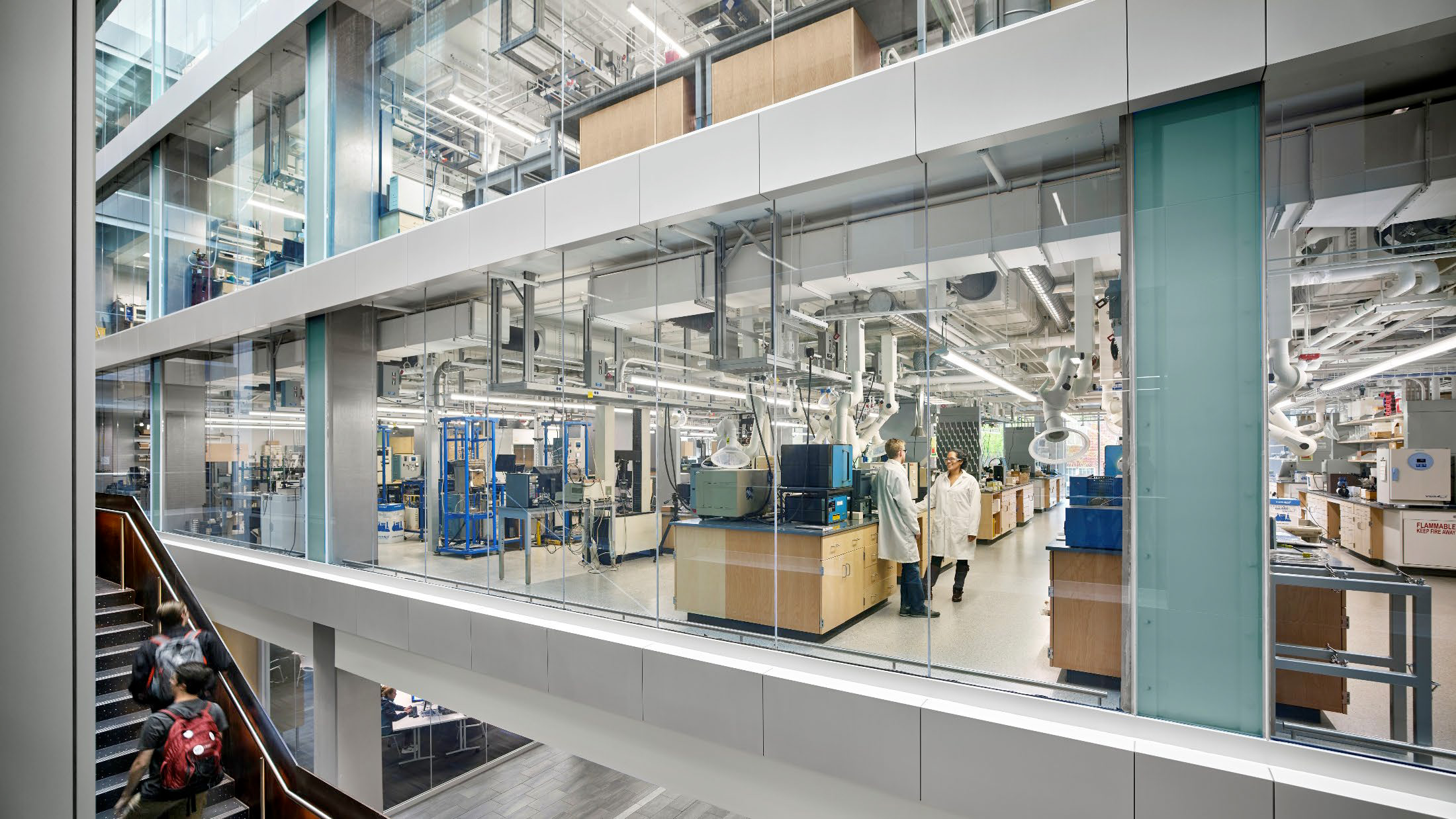
Cutting-Edge Research Laboratories
Spaces for re-imaging what is possible. Designed to foster innovation and the pursuit of the new knowledge needed to address twenty-first century issues.
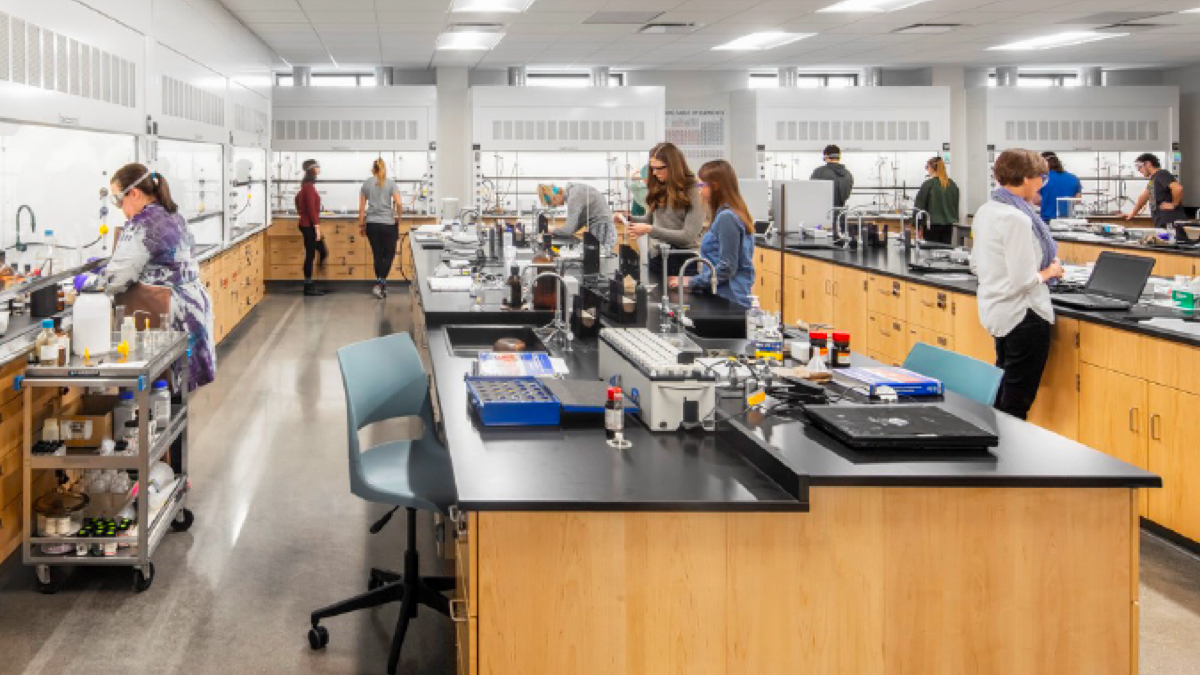
Innovative Teaching Laboratories
Creative spaces where students investigate, analyze, and reflect. Designed to give them the opportunity to test and apply theories and make abstract concepts concrete.

Synergistic Classrooms
Student-centered learning spaces. Designed to foster generative dialogue between learners and instructors.

Shared Collaborative Spaces
Spaces fostering further exploration and conversation. Designed to facilitate in-depth discussion between and across disciplines.
THE EXPERTS
Faculty List
Researchers and educators from the departments of Materials Science and Engineering, Chemistry, and Chemical and Biomolecular Engineering working collaboratively in the new AMIC space.
Materials Science and Engineering
Research emphasis area(s) highlighted in orange.
John Ballato
J.E. Sirrine Foundation Endowed Chair of Optical Fibers
Energy | Health | Adv. Manuf.
Ballato’s group develops new glass compositions and pilot scale fabrication techniques for state-of-the-art optical fibers used in telecommunications and defense.
Rajendra Bordia
George J. Bishop, III, Professor of Materials Science and Engineering
Energy | Health | Adv. Manuf.
The Bordia group focuses on processing and mechanics of ceramic coatings for extreme environment and porous ceramics for energy conversion and storage.
Kyle Brinkman
Department Chair
Energy | Health | Adv. Manuf.
Brinkman’s group develops new materials for use in energy conversion and storage applications such as batteries, fuel cells and nuclear energy.
Phil Brown
Swetenburg Professor
Energy | Health | Adv. Manuf.
The Brown group focuses on production and characterization of complex fibers via melt extrusion, solution processing and multi-component spinning.
Steve Foulger
Gregg-Graniteville Endowed Chair
Energy | Health | Adv. Manuf.
Foulger’s group has pioneered the development of materials for optogenetics including X-ray nanoparticles to control cells in living tissue as well as bio-based manufacture of multifunctional devices.
Kai He
Asssistant Professor
Energy | Health | Adv. Manuf.
The He group aims to understand microstructures at the interfaces of multiphase materials at the atomic scale for use towards the development of novel functional ceramics for next-generation solid-state batteries and fuel cells.
Luiz Jacobsohn
David and Mary Ann Bishop Dean’s Associate Professor
Energy | Health | Adv. Manuf.
The Jacobsohn group focuses on the design, synthesis, processing and characterization of inorganic luminescent materials including nanoparticles, transparent ceramics and glasses.
Mark Johnson
Thomas F. Hash Endowed Chair in Sustainable Development
Energy | Health | Adv. Manuf.
The Johnson group leads the development of advanced manufacturing technologies including information technology and SMART manufacturing and technology commercialization.
Molly Kennedy
Associate Professor
Energy | Health | Adv. Manuf.
The Kennedy group focuses on the role of microstructure in mechanical, tribological and fatigue performance.
Kostya Kornev
Professor
Energy | Health | Adv. Manuf.
The Kornev group develops the materials science of natural multifunctional microfluidic complexly shaped fibers including the exploration of wetting and capillary phenomena which form the basis of printing and adhesion.
Olga Kuksenok
Associate Professor
Energy | Health | Adv. Manuf.
The Kuksenok group studies the dynamics of responsive polymer gels and conducts modeling of multicomponent polymer blends.
Igor Luzinov
Kentwool Distinguished Professor
Energy | Health | Adv. Manuf.
The Luzinov group develops composites with orientable magnetic properties and leads the development of 3D printed multi-materials.
Thompson Mefford
David and Mary Ann Bishop Dean’s Associate Professor
Energy | Health | Adv. Manuf.
The Mefford group studies nanoparticle synthesis and the development of surface modification with functional polymers including MRI contrast agents to measure mild traumatic brain injuries.
Fei Peng
Associate Professor
Energy | Health | Adv. Manuf.
The Peng group studies integrated additive/subtractive manufacturing of ceramics and laser sintering of functional devices.
Ulf Schiller
Asssistant Professor
Energy | Health | Adv. Manuf.
The Schiller group focuses on computational bio-medicine including the simulation-driven design of drug-eluting stents and particle stabilized emulsion gels.
Joshua Tong
David and Mary Ann Bishop Dean’s Associate Professor
Energy | Health | Adv. Manuf.
The Tong group focuses on discovery energy material by machine learning and high throughput experiments and laser 3D printing of ceramics for energy devices.
Marek Urban
J.E. Sirrine Foundation Endowed Chair in Advanced Fiber-Based Materials
Energy | Health | Adv. Manuf.
The Urban group develops self-healing copolymers, stimuli-responsive nanomaterials, and bio-active polymer interfaces.
Kim Weirich
Assistant Professor
Energy | Health | Adv. Manuf.
The Weirich group focuses on actin cytoskeleton, a soft, structural biomaterial, and properties of biological self-organization.
Chemistry
Research emphasis area(s) highlighted in orange.
Jeff Anker
Wallace R. Roy Distinguished Associate Professor
Energy | Health | Adv. Manuf.
Dr. Anker’s research focuses on chemically specific radiological imaging and spectrochemical bioanalysis.
Steve Creager
Professor
Energy | Health | Adv. Manuf.
Dr. Creager’s research is in the general area of electrochemical science with an emphasis on energy conversion and storage including hydrogen fuel cells and lithium ion battery materials.
Joe Kolis
Tobey-Beaudrot Professor
Energy | Health | Adv. Manuf.
Dr. Kolis’ group studies the synthesis and chemistry of novel inorganic compounds with unusual structures and properties. They focus on crystal growth, laser/non-linear optical materials, new materials for quantum computing, and nano-scintillators for optogenetics.
Ken Marcus
Professor
Energy | Health | Adv. Manuf.
The focus of Dr. Marcus’s research is the separation of methods for bioanalysis and biopurification and spectrochemical methods for analysis.
Sourav Saha
Associate Professor
Energy | Health | Adv. Manuf.
Dr. Saha’s research focuses on mental-organic frameworks for energy conversion and photovoltaics as well as anion recognition, sensing, photocatalytic water splitting, and drug delivery.
Ya Ping Sun
Frank Henry Leslie Professor
Energy | Health | Adv. Manuf.
Dr. Sun’s research is in the area of carbon nanodots and nanomaterials for energy and health applications as well as energetic materials.
Thao Tran
Assistant Professor
Energy | Health | Adv. Manuf.
Dr. Tran’s laboratory is addressing challenges in the functional properties of complex optical, magnetic and electronic materials for twenty-first century technologies through development of novel synthetic strategies combined with structure and advanced physical properties characterization.
Daniel Whitehead
Associate Professor
Energy | Health | Adv. Manuf.
Dr. Whitehead’s research focuses on organic synthesis methodology, advanced catalysis, and drug discovery.
Chemical and Biomolecular Engineering
Research emphasis area(s) highlighted in orange.
Marc R. Birtwistle
Associate Professor
Energy | Health | Adv. Manuf.
Dr. Birtwistle explores how variability between individual cells influences both signaling in cancer cells and the response of cancers to therapies, and he addresses these issues by combining experiments with mathematical modeling.
Eric Davis
Assistant Professor
Energy | Health | Adv. Manuf.
Dr. Davis’ current research focuses on the development of structure-processing-property relationships of polymer membranes for energy storage and delivery applications, including fuel cells and redox flow batteries, as well as membranes for water desalination and moisture barrier applications.
Rachel Getman
Associate Professor
Energy | Health | Adv. Manuf.
Dr. Getman’s current research focuses on understanding both gas and aqueous phase catalysis, and she is interested in developing catalysts for biomass reforming, water purification, exhaust gas treatment, and other applications.
Scott Husson
Sturgis Distinguished Professor
Energy | Health | Adv. Manuf.
Dr. Husson uses synthetic and polymer chemistry to create advanced separation materials to tackle some of society’s grand challenges: affordable medicine, access to clean water, sustainable energy generation, and prevention of nuclear terror.
Sapna Sarupria
Associate Professor
Energy | Health | Adv. Manuf.
Dr. Sarupria creates sophisticated models to better understand how materials behave at the molecular level and is currently focused on specific problems that are motivated by challenges in energy, environment, and bioengineering.
FAST FACTS
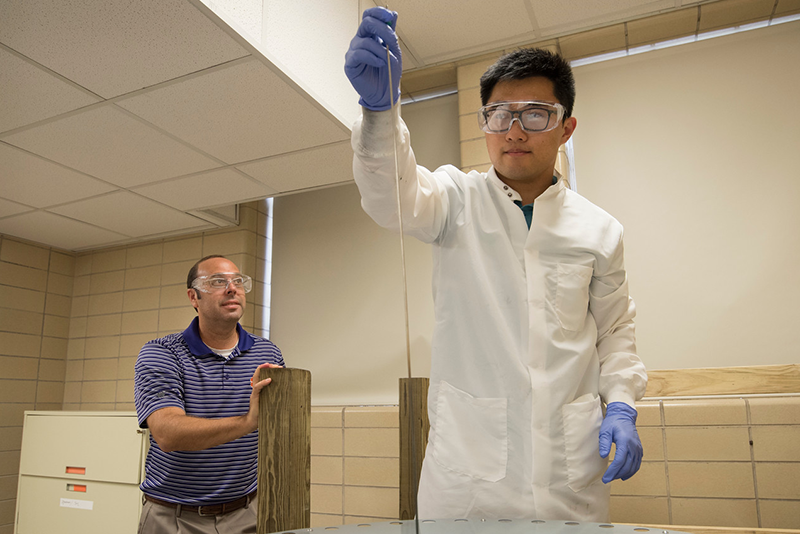
Materials Science and Engineering Department
Kyle Brinkman
Department Chair
ksbrink@clemson.edu
clemson.edu/mse
US News and World Report Ranking (Publics): 29
Tenured/tenure-track faculty: 19
Enrollment (Spring 2020)
Undergraduate: 108
Master’s: 20
Doctoral: 46
Total: 174
Degrees awarded (12/18; 5/19; 12/19)
Undergraduate: 46
Master’s: 6
Doctoral: 8
Total: 60
Research expenditures: $6.2M (FY19)
Research thrusts: advanced manufacturing; energy materials; polymer structure and design; photonics, electronic & magnetic materials; biomaterials and functional interfaces; materials in extreme environments
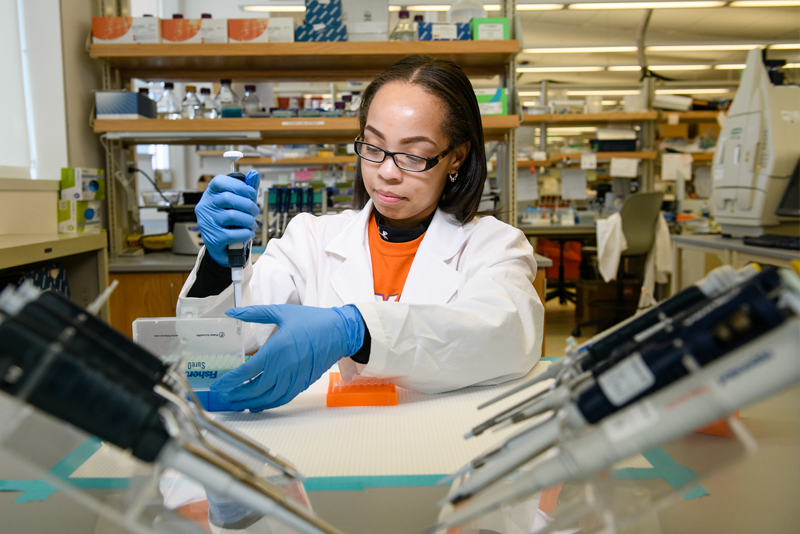
Chemistry Department
William T. Pennington
Department Chair
billp@clemson.edu
clemson.edu/chemistry
US News and World Report Ranking (Publics): 62
Tenured/tenure-track faculty: 23
Enrollment (Spring 2020)
Undergraduate: 150
Master’s: 5
Doctoral: 89
Total: 244
Degrees awarded (12/18; 5/19; 12/19)
Undergraduate: 29
Master’s: 6
Doctoral: 20
Total: 55
Research expenditures: $3.9M (FY19)
Research thrusts: advanced materials; health innovation; energy; cyberstructure infrastructure and big data science; sustainable environment
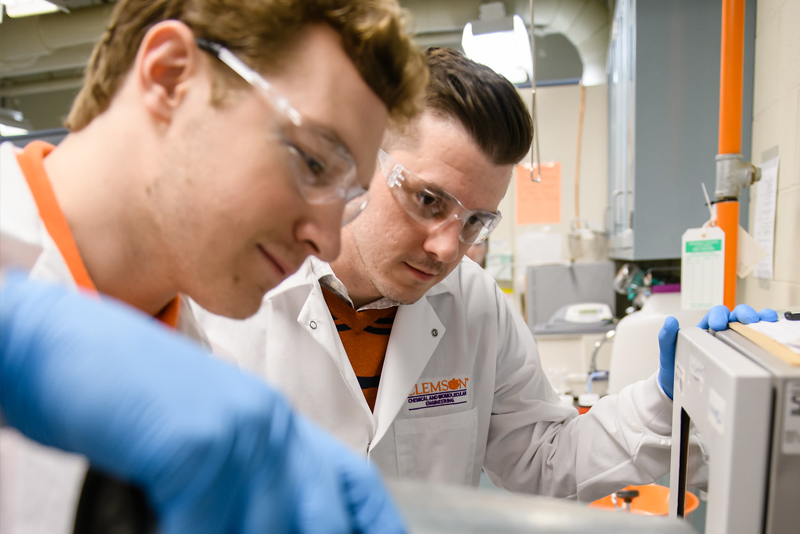
Chemical and Biomolecular Engineering Department
David Bruce
Department Chair
dbruce@clemson.edu
clemson.edu/chbe
US News and World Report Ranking (Publics): 31
Tenured/tenure-track faculty: 12
Enrollment (Spring 2020)
Undergraduate: 218
Master’s: 6
Doctoral: 53
Total: 277
Degrees awarded (12/18; 5/19; 12/19)
Undergraduate: 84
Master’s: 2
Doctoral: 8
Total: 94
Research expenditures: $3.8M (FY19)
Research thrusts: advanced materials; kinetics and catalysis; energy; chemical and biochemical separations; molecular modeling and simulation; biosensors and biochips


